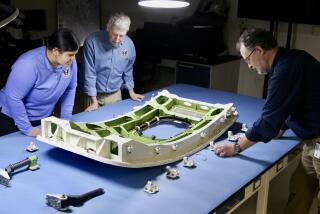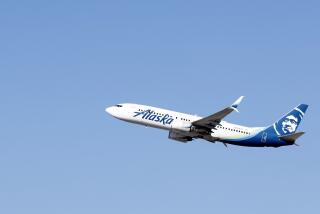Executive Travel : House Panel Weighs Revisions for Reporting On-Time Arrivals
If one airliner is delayed by a thunderstorm, a second by an engine problem and a third by an air traffic control breakdown, how many of them should be counted as late?
That question has perplexed the House Transportation aviation subcommittee as members ponder a Transportation Department plan to exempt mechanical problems from on-time reports.
Under current rules, all three of the airliners would be tardy if they arrived more than 15 minutes after their scheduled time. But that’s only been the case since Jan. 1.
Before this year, delays caused by mechanical problems didn’t count. And federal regulators are considering going back to that system.
Including mechanical delays in on-time reports gives consumers an accurate accounting of airline performance, according to consumer activists and some industry officers.
“It’s important to consumers to know if a company is not maintaining its planes, not upgrading older ones,” Rep. Robert Menendez (D-N.J.) said.
But others argue that safety could be compromised if mechanics feel pressured to approve use of planes in order to keep on schedule.
Today’s major airlines would never knowingly encourage workers to release an unsafe plane, said Rep. James L. Oberstar (D-Minn.). “But we cannot assume that every airline will place the necessary priority on safety.”
Transportation Secretary Federico Pena raised the possibility of restoring the mechanical-problem exemption following an aviation safety conference in January, where the idea of pressing mechanics to approve planes was discussed.
Robert W. Baker, executive vice president of American Airlines, argues in favor of counting mechanical delays in an airline’s on-time performance so the information would have consumer credibility.
“The counter-argument that safety would be compromised by mechanics in their zeal to avoid reportable delays is wholly without merit and is insulting,” he said.
Delta Air Lines Vice President John Lauber agrees, saying that deleting the mechanical delays “impugns the integrity of our employees.”
The on-time reports filed since Jan. 1, when mechanical delays were included, are the first since the system was begun in 1987 that accurately reflect true air carrier performance, Lauber said.
But John S. Kern, vice president of Northwest Airlines, is on the other side of the issue--encouraging the department to resume exempting mechanical delays.
“Including mechanical delays in on-time reporting may well have an impact on the safety of our system. There is no legitimate reason for assuming any additional safety risk,” Kern said.
However, consumer advocates favored counting mechanical delays. “How can travelers, who absolutely, positively must get there . . . rely on DOT data, when, in fact, it does not paint a true picture of an airline’s on-time performance?” asked Linda Golodner of the National Consumers League.
More to Read
Inside the business of entertainment
The Wide Shot brings you news, analysis and insights on everything from streaming wars to production — and what it all means for the future.
You may occasionally receive promotional content from the Los Angeles Times.










